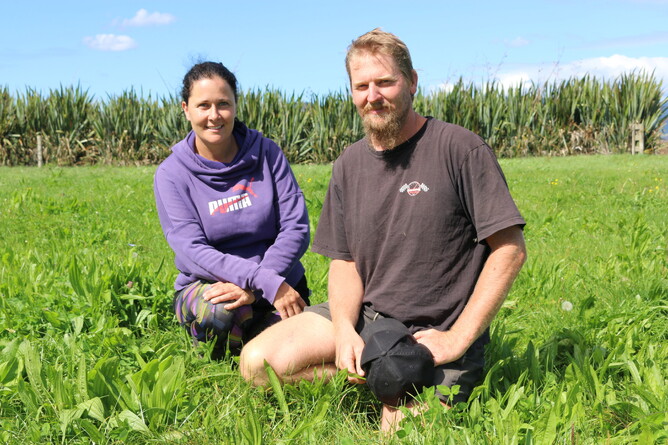At the foot of the Kaimai Ranges lies the Troughton dairy farm. Ben and Sarah Troughton sharemilk 500 cows on the 200-hectare property, which is owned by Ben’s parents Terry and Margaret, and has been in the family for more than 100 years.
A lot has changed over the last century, and the current generation of Troughtons are embracing a variety of sustainable and environmental farm practices because, as Ben says, it’s their duty to do so.
“At some point you have to change that old attitude of ‘this is how it’s always been done’ and start thinking about the sustainability of our land and the environmental impact we’re leaving,” he says. “It’s time to stop making excuses and start doing our bit.”
The Troughtons say they’ve incorporated sustainable practices slowly over a period of 10 years, a process Ben says is well worth the time and effort.
As regional councils around New Zealand implement policies to mitigate nitrogen leaching and improve water quality, farmers are looking at options to reduce surplus nitrogen on-farm while retaining a profitable system. Some of these options include controlled use of fertiliser and effluent, using low-nitrogen supplements and reducing cow numbers.
On the Troughton farm, they’ve reduced their herd number from 700 to 500 and introduced split calving in autumn and spring, year-round once-a-day milking, controlled feeding and stand-off periods, and irrigating effluent onto crop paddocks.
“Our production is down about seven per cent, but it’s outweighed by the facts our cows and calves are healthier, we have smaller breeding costs and our vet bills are down.”
The Troughtons have also made smaller sustainable changes to their farm operation. “Things like scraping the feed pad instead of hosing down, being conscious of our water use in the shed, composting, and riparian planting alongside our drains – little things that all add up.”
They’re keen to incorporate solar energy in the milking shed and experiment with growing more of their own feed in an effort to reduce imported and chemically sprayed feed.
Nitrogen leaching is also an issue Ben is conscious of. He’s experimented with plantain, mixing it into grass seed mix, and he’s currently re-grassing some of his paddocks with a mix of Ecotain, ryegrass and clover as part of a pasture trial with researchers from the University of Waikato.
Ecotain hit the headlines last year when proprietary seed company Agricom announced research findings that showed the plantain cultivar facilitated a significant reduction in nitrogen leaching from livestock urine patches, by as much as 90 per cent in some cases.
Ben says plantain has been part of his pasture and grazing planning for a while, but the research announcement was welcome news.
“We’d been using plantain, before Ecotain, in our grass seed mixes. We also used it in pugged areas as we found it took well to disturbed soil - it grew well and helped settle the damage.
“Plantain’s been around for a while so it was great to hear about the research findings on Ecotain. It’s another thing we can add to everything else we’re doing.”
He says there’s no magic bullet for solving environmental issues on-farm, but he’s heartened by the efforts being made by industry to provide more sustainable options.
“I couldn’t sit here and say one thing in particular is going to solve all of our problems. It’s a matter of looking into what’s out there and incorporating what you can and what’s right for your farm.”
He says there’s nothing stopping other farmers from making the move to more sustainable farming practices and he’s keen to see more farmers move down this path.
“It’s absolutely about attitude. We have to stop sacrificing the health and quality of our land for short-term gain, for the quick wins,” he says. “Milk production will always be a factor for dairy farms, but for the sake of a few extra milk solids we can take steps now that’ll result in long-term results.”

